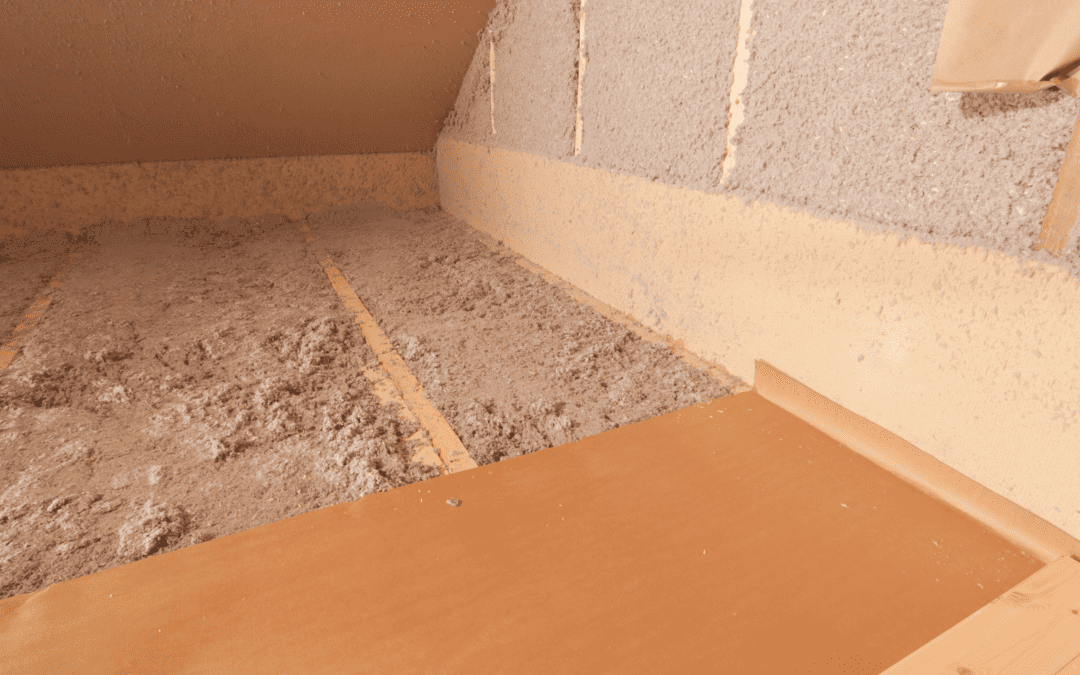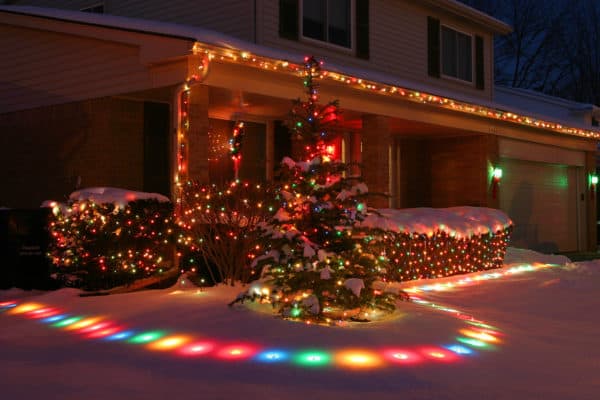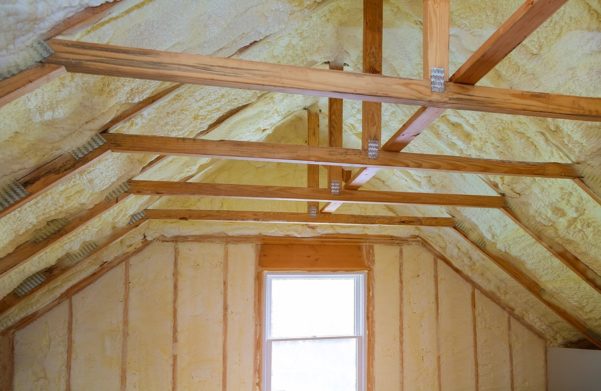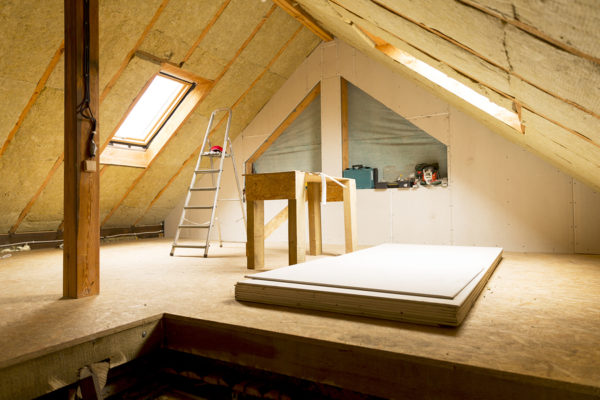READY TO GET STARTED?
REQUEST A FREE ESTIMATE
Fill out the form below or call (888) 466-7849 for a free, no-obligation estimate.

The summer months in the south bring bugs, humidity, and unbearable heat. When inside, you might feel inclined to touch the thermostat to create a cooler environment, but maybe it doesn’t seem to budge. If this is your case, it might be time for new or better insulation in your attic.
When the hot summer sun is beating down on your home, your attic is the first thing to see higher temperatures. The heat will absorb into the hard materials that make up your home and are likely to transfer downstairs into your living area, creating an uncomfortable living environment. An easy solution is to get the insulation checked in your attic.
Attic insulation creates air pockets that slow the heat from attempting to flow through your home. This will help uneven temperatures between the rooms in your house. Installing insulation can additionally help your HVAC system run more efficiently. This will keep you from wanting to turn down the thermostat and result in lower energy bills.
There are many benefits to getting your attic insulated, including:
If you believe you need to replace your attic’s insulation, consider reaching out to your local pest control company for a quote to experience a cooler and pest-free home for the summer.

With the holidays looming near, you may be looking for areas where you can cut back on costs to give you that extra holiday cushion. We have a few tips you can consider that can not only help you go green but also put some extra cash back in your pocket!
Properly insulating your home can help energy efficiency throughout, helping you save money in the long run, not just the holiday season. Let Northwest help you go green and save green! Call and schedule your free inspection today!

This unseasonably hot weather has catapulted us straight into summer. If you have found yourself making multiple trips back and forth to your thermostat, it may be time to look into improvements around your home that not only stop the multiple trips but also save you money in the end.
With the sun beating down on the roof of your home with little to no cloud cover, your attic will easily see high temperatures during the summer. Without proper insulation, the heat will absorb through the hard materials that make up your home, leading to unbearable temperatures inside.
Proper attic insulation will create air pockets which slow the heat attempting to flow through your home. This will help uneven temperatures between the rooms in your home and lessen the need to consistently visit your thermostat.
High heat and humidity have caused your home to become muggy and intolerable. The humidity and moisture can also become a welcoming environment for mold, fungi, and pests.
Investing in the encapsulation of your crawl space could not only save you money on your energy bills, but also prevent a headache in the long run. Termites thrive in areas of high moisture, putting your home at risk for structural damage. Not only will this method act as pest control, but it can also improve the air quality of your home and create more comfortable living conditions for you and your family.
Still on the fence? Give us a call to schedule your free inspection today, and one of our licensed professionals will answer all of your questions.

With the start of a new year, you may have begun to purge your home of unnecessary items or mapped out a major cleanup day. While the most lived in rooms are probably on your radar – the kitchen, bathroom, living room, and bedrooms – areas like your basement and attic can become catch all-areas or forgotten altogether. These neglected spaces are then susceptible to pest invasions and other home issues.
These tips are only part of your healthy home journey. Schedule a pest inspection with a licensed exterminator, who can identify current pest issues, potential pest threats in the future, and provide a personalized pest control plan for ongoing prevention.
Pest Control: Where Do Pests Go In The Winter?
Wildlife Control: Sneaky Wildlife – Possums and Raccoons
Lawn Care: 10 Ways To Care For Your Lawn In Extreme Heat
Termite Control: 10 Things You Didn’t Know About Termites
Is Green Pest Control Worth The Investment?

Even though we’re well into the winter season, it’s never too late to weatherproof your home. These easy fixes will not only seal up your home and keep it nice and warm, they will also help save you some money on your energy bills this year. Check out these simple winter weatherproofing tips so you’ll be prepared just in case the groundhog DOES see his shadow this year!
Check your doors and windows to make sure they are in good repair. Insulate your doors and windows with weatherstripping. Use transparent weather sealant tape for any areas where the weatherstripping will be applied directly to the door or window. This tape can also be used to temporarily seal any cracked windows until you can permanently replace them. Use door sweeps on the bottoms of exterior doors to keep cold air from coming in. You can install them with nails or with adhesive.
Attics and crawlspaces are notoriously cold areas of your home. Thermal accoustical pest control (TAP) insulation is an energy star rated attic insulation that provides several benefits to your home. TAP eases the burden on your heating and cooling systems, making them more efficient and keeping the temperature in your home more consistent throughout the year. TAP also leads to a 20-38% savings on your energy bills AND protects your home against pests including roaches and ants. Finally, TAP is treated with a fire retardant that limits the spread of fire in your home.
Complete CrawlSpace enclosure is another way to weatherproof your home. Enclosing your crawlspace with Complete CrawlSpace increases energy efficiency, prevents mold growth, and completely closes off your crawlspace to pests. This can also save you up to 18% on your energy bills each year.
Most garages aren’t insulated which makes them very chilly spaces in the winter. Install weather sealing strips on the bottom of your garage door. These strips not only keep out cold air but also keep out rain and pests as well.
Outlets and switches on the exterior walls of your home can be a big source of cold air. One solution is to install foam outlet and switch sealers. These can be installed by simply turning off the power, removing the outlet or switch cover, applying the foam sealers, and reinstalling the covers.
Hardwood and tile floors can be especially cold in the winter. Curtains and rugs can make a big difference when it comes to heating your home. if you have drafty windows, hang some heavy curtains to keep the cold air out. Use area rugs on hardwood floors and in bathrooms with tile floors to help keep them warm.
Air conditioning units in walls and windows give a direct path for cold air into your home. One solution is to install a heavy duty polyethylene and vinyl cover that fits around the outside of the unit. You can also wrap the inside grill with plastic sheeting and double sided tape. Consider installing a programmable thermostat which will automate your interior temperature. This can save you up to $200 per year in heating and cooling costs.
Insulate your hot water heater with a water heater insulating blanket. This saves energy by reducing heat that is lost through the sides of the hot water heater by 25-40%. This reduction in heat loss can also lead to savings on your energy bills.